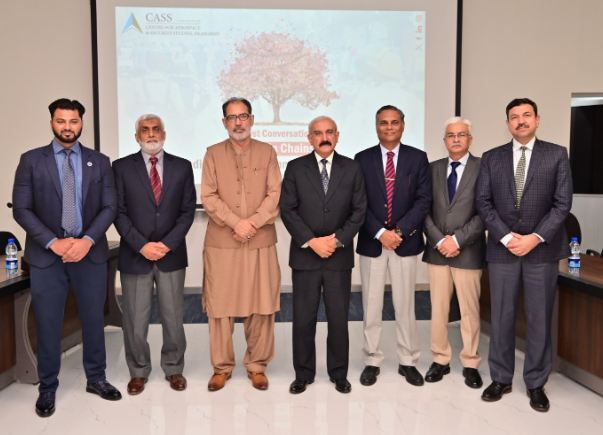ISLAMABAD, AUG 9 /DNA/ – The Centre for Aerospace & Security Studies (CASS), Islamabad, conducted a special session under its Catalyst Conversation Series on ‘Chinars in Chains: India’s Siege of Jammu and Kashmir’ with Mr Altaf Hussain Wani, Chairman, Kashmir Institute of International Relations, to discuss the current situation in Indian Illegally Occupied Jammu and Kashmir (IIOJK).
Air Marshal Farooq Habib (Retd), Senior Director at CASS, set the stage for the discussion and highlighted that the full integration of IIOJK into the Indian Union has been a central element of the BJP and RSS’s Hindutva agenda. He noted that abrogation of Articles 370 and 35A on 5th August 2019 by the Modi government were followed by severe security measures including curfews and communication blackouts in the disputed territory. Air Marshal Habib also observed that the Indian Supreme Court supported the government’s actions, which included the enactment of laws aimed at changing the region’s demographics by allowing an influx of non-Kashmiris. He shared that five years on, the Muslim majority in IIOJK continues to face marginalisation and repression, with the international community largely remaining silent on these issues.
In his Keynote Address, the Distinguished Speaker Mr Altaf Hussain Wani, Chairman, Kashmir Institute of International Relations, discussed the considerable socio-political and economic upheavals in Jammu & Kashmir since the revocation of Article 370 and 35A, marking five years of continued distress and despair. Mr Wani highlighted that Jammu & Kashmir remains under direct control from New Delhi, lacking an elected government, which he described as a severe democratic deficit. He noted that the region operates akin to a ‘police state’, with heightened levels of incarceration and constant surveillance.
About 19,000 people, including political and human rights activists, were detained, impacting over 8 million Kashmiris who faced shortages of essentials and medical supplies due to the lockdown. He further pointed out the economic turmoil within the region, stating that businesses have suffered immense losses while poverty, hunger, and unemployment have risen, starkly contradicting claims made by the Modi government. Mr Wani observed that in the recent Lok Sabha elections, the electorate in IIOJK expressed their dissatisfaction through their votes. Despite the BJP’s carrot and stick policy, it failed to secure a candidate for the three constituencies in the occupied Kashmir Valley, and their proxy candidates were also defeated, indicating that the Kashmiris’ support lies with those who champion their rights.
Mr Wani was of the view that significant settler-colonial policies are in place, including land acquisitions by non-local industrialists which disrupt the local Muslim demography. He underscored the issuance of over 500,000 new domicile certificates to non-Kashmiris as an intentional act to alter the demographic makeup of the region.
Regarding human rights, Mr Wani detailed numerous violations under the enforced draconian laws such as the Public Safety Act and the Armed Forces Special Powers Act. These laws, he said, have facilitated a surge in extrajudicial killings, arbitrary detentions, and a general misuse of anti-terrorism legislation.
He lamented the international community’s response, noting that despite criticisms from UN Special Rapporteurs about the incompatibility of India’s actions with international human rights standards, there remains a lack of accountability for these abuses. Mr Wani also criticised the severe restrictions on media freedom and the suppression of dissent, which he said significantly curtails the flow of information and silences human rights defenders in the region. However, he also highlighted that the youth of IIOJK have become pivotal in conveying the ground realities of suppression. In the absence of external support, this younger generation has not only been a source of information but also a source of strength. They have successfully established a support base beyond the international press, a feat that eluded the previous generation.
In his Concluding Remarks and Vote of Thanks, Air Marshal Javaid Ahmed (Retd), President CASS-Islamabad, reflected on the strategic and diplomatic approaches necessary for addressing the Jammu and Kashmir dispute. He discussed the limitations of strategic patience or a defensive posture in dealings with India, asserting that such approaches are unlikely to bring about a resolution. He advocated for the proactive use of modern communication tools. ‘The active employment of social media, along with cultural productions such as dramas, movies, and songs about the occupied territory, and leveraging influencers in these mediums, are critical strategies for shaping international perceptions and garnering global support for Jammu & Kashmir,’ he noted. President CASS also stressed the importance of developing Azad Kashmir as a model for future governance and development strategies in the region. ‘We must critically assess our development achievements in Azad Kashmir; it should serve as a benchmark for envisioning the future of Kashmir,’ he concluded.

















